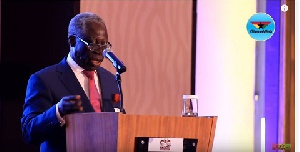Senior Minister, Yaw Osafo Maafo, has opposed the idea of totally abolishing subsidy on electricity supply, arguing that various situations may necessitate the subsidizing of power to a segment of consumers.
Speaking at the just-ended two-day Ghana Energy Summit, Ing. Osafo Maafo said: Energy is what we need as a constant to make the economy work. I heard from one of the presenters that we should stop subsidies. That is an interesting conversation.
Subsidy can never be avoided 100%. No. Because there are certain situations and people that by virtue of their very nature you need to subsidize. But you should be able afford the subsidy, so you impose extra revenue to be able to afford the subsidy.
His comments follow recommendation by experts at the end of the two-day summit for the scrapping of subsidy as a way to enable producers recover their full cost of operation, as successive governments failed to pay for power subsided.
Exchange losses, Shortfall as a result of government intervention/subsidies on gazette tariffs, non-payment of bill by Government of Ghana (GoG) Installations, Security Installations, Hospitals, Schools, and non-payment of bills by the Ghana water Company Limited (GWCL) are the major causes of the huge indebtedness of the sector.
The energy sector debts stood at US$2,332million as at March 31, 2017. Indebted entities include: GoG, US$ 1,530m; Norther Electricity Distribution Company (NEDCo), US$8million; Volta River Authority (VRA), US$500million; ECG, US$28million; and Tema Oil Refinery (TOR) US$265million.
Despite the huge debt overhang, Ing. Osafo Maafo says the country must find a way to fund subsidies if need be.
We should find, in the system, a way of subsiding if we deem it necessary. We should not talk about subsidies been scrapped. As much as possible we should minimise it and be able to afford it. If you can't afford it don't do it, he argued.
Data available indicates that electricity coverage stands at about 80 percent of the population and government has signed onto different projects to ensure that the entire country has access to power by year 2020.
The country's electricity demand currently stands at about 2,225MW. This is growing by 10 percent per annum and is expected to hit 7,000MW by 2030.
However, fuel constraints -- crude oil, gas and water for hydro power generation have necessitated the need for exploring cost-effective, reliable, and clean power sources, which has made the government latch on to the clean coal power idea.
Business News of Friday, 16 June 2017
Source: thebftonline.com
Osafo Maafo stokes power subsidy debate
Entertainment












